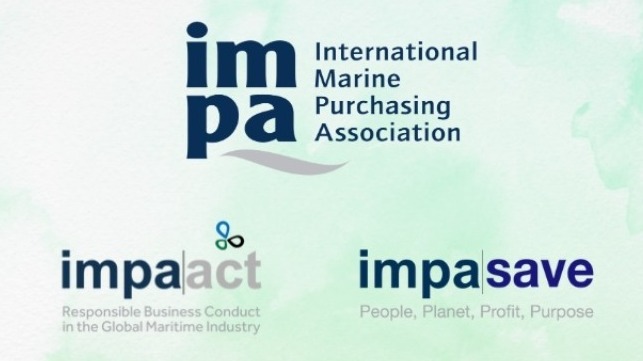IMPA: Purchasing Executives Play a Key Role in the Green Transition


that matters most
Get the latest maritime news delivered to your inbox daily.
As the global maritime industry transitions towards a more sustainable future, its stakeholders are looking closely at "greening" their own supply chains. Purchasing executives will play a key role in guiding and implementing maritime companies' choices on sustainable sourcing, and there's no time like the present to get started, according to the International Marine Purchasing Association (IMPA).
IMPA is a non-profit organization based in the UK, and it has been supporting marine procurement and supply chain management professionals since 1978. Today, it represents over 1,000 members who are committed to the industry's development. While the marine procurement sector has traditionally focused on securing quality goods at the best price for maritime companies, the industry is changing to match the new needs of the market, according to Stephen Alexander, COO and Secretary General of IMPA. Sustainability is more important than it has ever been, and IMPA is developing new programs to help procurement executives lead the way.
Ten years ago, the organization launched the IMPA ACT responsible supply chain management program. It was a world-first initiative, designed to meet the UN Global Compact standards for responsible sourcing. Its partners pledge to uphold the IMPA ACT Code of Conduct, a set of guiding principles for minimum standards of responsible business. The requirements include due diligence processes to minimize the company's operational impact on human rights, the environment (including the climate) and anti-corruption principles.
Despite the challenges of the COVID-19 pandemic, IMPA has been expanding on its early foray into responsible procurement. With the support of its members, IMPA ACT is now transitioning to a "v2.0" version, adding internal CSR due diligence and a cloud-based tracking platform.
IMPA has also expanded on this initiative with its newly-created IMPA SAVE campaign, which focuses on removing plastic from the marine supply chain. In joining IMPA SAVE, shipowners, shipmanagers and shoreside suppliers pledge to significantly reduce or remove single-use plastic water bottles from their operations. The industry creates an estimated 40 tonnes of plastic waste each year from water bottles alone. "Since launching IMPA SAVE in November, we've now got about 40 ship owners and 15 percent of the global fleet signed up to reduce water bottle use," Alexander says.
To encourage crewmembers to use filtered potable water instead of plastic bottled water for their everyday needs, IMPA's program participants support educational campaigns to drive shipboard cultural change. IMPA is also working with partners to set up a new brand of TetraPak drinking water cartons for shipboard use, along with the supply chains for distribution. This will provide an easy non-plastic alternative for backup and emergency applications.
"With many vessels already operating with a functioning reverse osmosis or evaporators onboard, the addition of a filtration system means drinking water is freely available, offering a return on investment that benefits all," says Mikael Karlsson, the program’s chair and IMPA’s sustainability special ambassador.
IMPA encourages maritime companies and supply chain professionals to get involved and join its journey towards more sustainable procurement practices. "Green" purchasing is becoming a business necessity and an opportunity for growth, according to Alexander.
"Today, if you're buying purely on price without any consideration to the environment, then you are going to be seen to be quite out of date in the culture of your business," says Alexander. "In the long run, the customer won't accept that because of increasing regulation, NGO pressure and the influence of how shipping companies' own customers expect them to behave and act."
Procurement professionals are vital in adapting to this changing environment, as they're best-placed to find creative solutions. For example, it is increasingly popular to source a large share of ships' stores locally. Buying food within the same region as the seaport reduces the fuel needed to transport goods to the gangway.
"There's much more for the procurement manager to be looking at now to make sure that the company is walking the talk," Alexander says. "We want to encourage more people in our profession to get involved and work together to find real solutions. It's time to put aside our competitive interests and address shared challenges."
This article is sponsored by IMPA. To find out more, please visit www.impa.net. Details on IMPA ACT may be found at www.impa-act.org, and IMPA SAVE may be found at www.impasave.org.
The opinions expressed herein are the author's and not necessarily those of The Maritime Executive.
